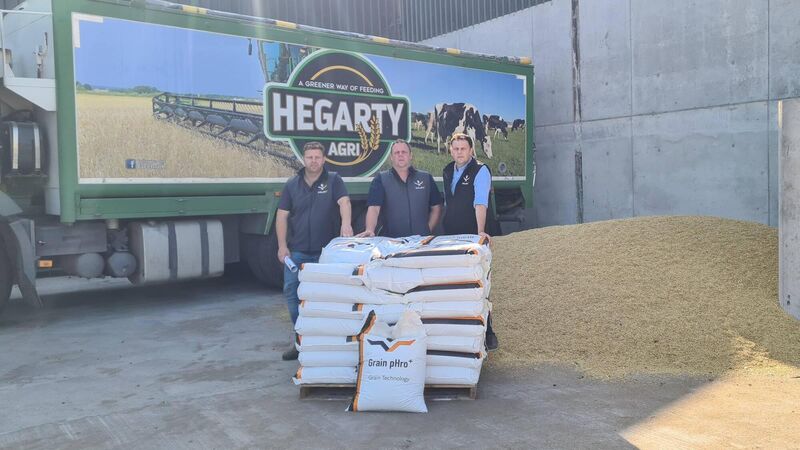Conserve and enhance grains with ease, says leading Munster supplier

Brothers James, William and Patrick Hegarty are ensuring a greener and more sustainable way of feeding livestock through Hegarty Agri.
With a sizeable increase in cereal acreage and uncertainty in the feed markets, many farmers are now looking at the option of treating home grown or locally sourced grain for winter feeding.
The Hegarty brothers — James, William and Patrick — of Hegarty Agri in Whitechurch, Co. Cork welcome the trend, but they warn it's important to do your research before hopping on the bandwagon.
“Given current feed prices, many farmers will want to feed locally grown cereals next winter. While many don’t have grain drying systems, there are many feasible options for on-farm storage. Treating grain with a product that works well under local conditions is the best option," states William.
The Hegarty Brothers are long-established cereal grain growers and have been supplying local livestock farmers with high quality grain and straw for many years. Hegarty Agri’s approach to locally sourcing and supplying cereal grains ensures a greener and more sustainable way of feeding livestock.

“With huge volatility in global feed markets, farmers will want to make best use of their own or locally sourced grain. Using a treatment and storage system that also adds to the nutritional value of the grain is proving very popular. We are using a product called Grain pHro+, which has been designed specifically to preserve and add significant nutritional value to harvested grains, whole crop forages and straw.
The product was developed and produced in Ireland and comprises a unique mix of enzymes and digestible fibres. The application method is straightforward and meets the full criteria set by farmers wishing to feed treated grains with confidence.
“We are already receiving strong enquires from farmers that are using the treatment system this harvest,” confirms Patrick. “The product is combined with feed grade urea at a mixing rate of 5kg of to 15kg of feed grade urea per tonne of grain or forage treated.
“The treatment system works to increase grain or forage pH to values between 8.5 and 9.2 helping to enhance the nutritional value of the diets offered to beef and dairy cattle.”

“Driving all of this is the fact that the Grain pHro+ treated feeds are alkaline in nature, which helps to prevent acidosis taking place in the rumen. Almost all grass silages and other preserved forages made in Ireland are relatively acidic, thereby decreasing rumen pH values," Patrick adds. “As a result, animals are greatly disposed to acidosis, which will act to severely impact on performance, where beef and milk production are concerned.
“The application of will act to reduce the amount of rumen buffers that would be added to a ration, in order to prevent acidosis taking place in the first instance," James Hegarty explains.
“Grain pHro+ breaks new ground, given that the product not only preserves feeds but adds significantly to their nutritional value. The treatment process specifically acts to increase the amounts of dietary protein available to stock. The increase in protein averages 4.5 points (e.g barley at 11% protein will be increased to 15.5%).

“The product can be applied to all grains, including maize grain, with moisture contents in the range of 15% to 20%," James adds. "We also supply Grain pHro+ treated grains from our farm directly to farmers who don't have access to harvest grain. We can supply this grain tipped or blown into bins on a year-round basis."
“Applying is very straightforward. Grain to be treated can be easily mixed with and feed grade urea in a feeder wagon or through most mobile grain rolling equipment. The treated grain can be put in store under plastic for 14 days.
“After 14 days the treatment process is complete, after which the grain is ready for feeding."
He continues: “Grain pHro+ can be fed to all ruminant animals. The alkaline nature of the product and its increased digestibility will allow for higher rates of quality, starch-based cereals to be fed while at the same time helping to improve rumen conditions."
“In addition, farmers’ requirement for purchased protein feeds can be greatly reduced, as a result of treating their own grain," concludes William.
“Treated grain must be fed to stock as part of a nutritionally balanced diet. Hegarty Agri, with the support of developers Stadee Limited, bring a wealth of experience of grain treatment systems and offer a bespoke service to all farmer-customers. This includes the production of high specification rations based on native cereal grains."
For further information, contact James Hegarty (086 815 2557) or William Hegarty (087 768 0702) or see www.grainphro.com.
You can also visit www.sustainingireland.ie.









